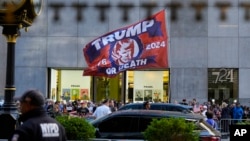Former U.S. President Donald Trump vowed to appeal his guilty verdict, a day after a jury of New York citizens convicted him of all 34 felony counts related to his attempt to illegally influence the outcome of the 2016 national election.
“It was a rigged trial,” exclaimed the former president, who spoke to a small group of reporters and supporters Friday inside his midtown Manhattan Trump Tower.
Trump, for 33 minutes, delivered an unscripted and rambling list of grievances about the case, the country and President Joe Biden. Trump claimed — without evidence — that the judge in his case was corrupt and unfair, and that the New York state legal proceedings were orchestrated by Biden and federal officials.
“I’m very honored to be involved because we’re fighting for our Constitution,” added Trump during his remarks.
Biden, at the opening of a White House speech about the Middle East, noted that the unanimous verdict against Trump came after the jury heard five weeks of testimony and that the former president was given every opportunity to defend himself.
“And it’s reckless, it’s dangerous, it’s irresponsible for anyone to say this was rigged just because they don’t like the verdict,” said Biden on Friday.
The 12-member jury deliberated for about 10 hours over two consecutive days before returning Thursday’s verdict, making Trump the first U.S. president to be tried and convicted on criminal charges.
Trump is the presumptive 2024 Republican presidential nominee in the November election against Biden, the Democrat who defeated him in the 2020 election. But Trump now faces the possibility of being placed on probation or imprisoned for up to four years.
Sentencing has been set for July 11, in the middle of his campaign to return to the White House and just prior to the start of the July 15 Republican National Convention, where he would be formally nominated as the party’s presidential candidate.
Following the verdict, Trump defense lawyer Todd Blanche immediately asked that it be overturned, but New York Supreme Court Justice Juan Merchan rejected the request.
Inside the courtroom, Trump showed little emotion as he learned his fate. But when he emerged from the courtroom Thursday, he said the verdict was “a disgrace.”
The Trump campaign then quickly sent out a fundraising email quoting the former president stating, in all capital letters, “I am a political prisoner!”
From the start of the trial in mid-April, Trump had treated the case with disdain, disparaging prospective witnesses against him despite Merchan’s gag order prohibiting him from doing so. Merchan found Trump in contempt of court 10 times and fined him $10,000, which the judge acknowledged was a pittance for a billionaire like Trump.
Merchan had excluded himself and prosecutor Alvin Bragg from his gag order. As a result, Trump virtually every day of the trial assailed them as he walked into court, especially the judge, whom he described as “corrupt” and “conflicted,” apparently because he made a $35 donation to Biden and Democrats in 2020.
Noting that Trump, “convicted felon or not,” will be the Republican nominee for president, Biden campaign spokesperson Michael Tyler said the opportunity to halt the now convicted felon’s return to the White House Oval Office will come on November 5 at the ballot box, adding “the threat Trump poses to our democracy has never been greater.”
Trump is certain to appeal his conviction and can continue to run for office. There is no U.S. constitutional prohibition against him becoming president as a convicted felon.
Eugene V. Debs, who had run unsuccessfully for president four times previously and was a household name of the era, ran again as the Socialist Party nominee in 1920 while imprisoned for violating the Espionage and Sedition acts. He was allowed by authorities to issue one written statement weekly from the Atlanta Federal Penitentiary. Debs captured more than three percent of the vote in the general election.
There has been only one federal officeholder who was successfully elected while imprisoned. Congressman Matthew Lyon, of the Democratic-Republican Party, in 1798, was reelected to his Vermont seat while jailed for sedition for his criticism of President John Adams.
If Trump, who is 77, wins a non-consecutive second term in November he would have broad pardon powers related to convicted federal defendants, but he could not pardon himself for the New York conviction because it was a state case distinct from federal jurisdiction.
Trump faces three other indictments, including two accusing him of illegally trying to upend his 2020 election loss. All three cases are tied up in legal wrangling between his lawyers and prosecutors. As a result, the New York case may be the only one decided before the November election.
Trump was convicted after Michael Cohen, his onetime political fixer turned critic, testified that Trump told him to “just do it” — pay $130,000 in hush money days ahead of the 2016 election to adult-film actress Stormy Daniels to silence her claim she had a one-night tryst with Trump a decade earlier.
Trump again on Friday denied any liaison with Daniels.
“Nothing ever happened,” he said.
A hush money deal is not illegal. Trump was convicted of charges of falsifying business records at his Trump Organization real estate conglomerate to hide the 2017 reimbursement of the hush money payment to Cohen, which Trump claimed was for Cohen’s legal work.
“It’s not hush money. It’s a nondisclosure agreement — totally legal. Totally common. Everyone has it,” Trump told reporters Friday.
The 34 counts covered 11 invoices Cohen filed with Trump company officials to be reimbursed, 12 ledger entries in the company’s records and 11 checks sent to Cohen, nine of which Trump signed.
The Trump defense team claimed Cohen, of his own volition and without Trump’s knowledge, wired the hush money to Daniels’ lawyer.
Trump said Friday that because of the judge’s gag order he cannot refer to his former attorney by name, before calling Cohen a once-effective lawyer who turned out to be a “sleazebag.”
VOA’s Ken Bredemeier contributed to this report.





